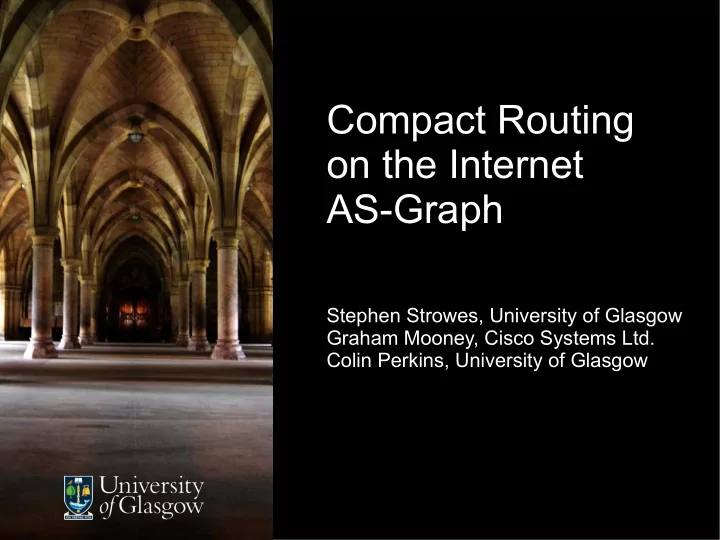

● Compact Routing on the Internet ● AS-Graph Stephen Strowes, University of Glasgow Graham Mooney, Cisco Systems Ltd. ● Colin Perkins, University of Glasgow 15 April 2011 Stephen Strowes, Global Internet 2011
Context Previous work: Compact routing has shown promise for reducing forwarding state Previous work has evaluated synthetic “Internet- like” graphs We use Internet topologies spanning 14 years 15 April 2011 Stephen Strowes, Global Internet 2011
Compact routing? Shortest-path routing: Space: linear space Stretch: 1 Compact routing: Space: sublinear space Stretch: 3 15 April 2011 Stephen Strowes, Global Internet 2011
Stretch-3 sounds bad! Previous work showed actual performance to be much closer to stretch-1 (on synthetic graphs at least) We perform systematic experimental analysis of two algorithms on Internet topologies 15 April 2011 Stephen Strowes, Global Internet 2011
Overview Two compact routing algorithms: Thorup-Zwick (TZ) Brady-Cowen (BC) 15 April 2011 Stephen Strowes, Global Internet 2011
Overview: Thorup-Zwick Routes via landmark nodes Defines forwarding entries using proximity to landmarks Nodes forward packets destination's landmark if destination not in local forwarding table 15 April 2011 Stephen Strowes, Global Internet 2011
15 April 2011 Stephen Strowes, Global Internet 2011
15 April 2011 Stephen Strowes, Global Internet 2011
15 April 2011 Stephen Strowes, Global Internet 2011
15 April 2011 Stephen Strowes, Global Internet 2011
15 April 2011 Stephen Strowes, Global Internet 2011
15 April 2011 Stephen Strowes, Global Internet 2011
15 April 2011 Stephen Strowes, Global Internet 2011
TZ Asymmetry 15 April 2011 Stephen Strowes, Global Internet 2011
Overview: Brady-Cowen Builds a primary spanning tree Then, builds additional, smaller spanning trees on the periphery Uses a distance labelling to select, at source, best tree to forward packets to desination 15 April 2011 Stephen Strowes, Global Internet 2011
15 April 2011 Stephen Strowes, Global Internet 2011
15 April 2011 Stephen Strowes, Global Internet 2011
15 April 2011 Stephen Strowes, Global Internet 2011
15 April 2011 Stephen Strowes, Global Internet 2011
Experimental Methodology Generate AS topologies Route Views BGP tables from 1997 through 2010 Run TZ & BC algorithms on all graphs to generate appropriate node labels/landmarks Determine path lengths TZ: Simulate forwarding from all nodes to 1% (random) of rest of network, and back BC: Deterministic, and known after pre-computation 15 April 2011 Stephen Strowes, Global Internet 2011
Results In the paper, we evaluate: Tweaks/parameters for each algorithm Multiplicative path stretch Additive path stretch Forwarding table sizes TZ landmark selection frequency and distribution of landmark set sizes 15 April 2011 Stephen Strowes, Global Internet 2011
Results: TZ, multiplicative stretch 15 April 2011 Stephen Strowes, Global Internet 2011
Results: TZ, additive stretch 15 April 2011 Stephen Strowes, Global Internet 2011
Results: BC multiplicative stretch 15 April 2011 Stephen Strowes, Global Internet 2011
Results: BC, additive stretch 15 April 2011 Stephen Strowes, Global Internet 2011
Table sizes 15 April 2011 Stephen Strowes, Global Internet 2011
TZ Table sizes 15 April 2011 Stephen Strowes, Global Internet 2011
TZ landmark selection 15 April 2011 Stephen Strowes, Global Internet 2011
Conclusions Experimental validation of: … strong performance on Internet graphs … consistent performance over long periods of time Insight into why the TZ algorithm performs well on this type of graph 15 April 2011 Stephen Strowes, Global Internet 2011
Future Work There is scope for further analysis how a decentralised protocol based on the TZ algorithm behaves in a dynamic network … and how this works at the router level rather than the AS level 15 April 2011 Stephen Strowes, Global Internet 2011
● Questions? ● ● ● ● Stephen Strowes ● sds@dcs.gla.ac.uk 15 April 2011 Stephen Strowes, Global Internet 2011
Recommend
More recommend